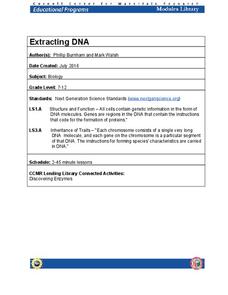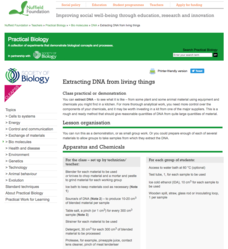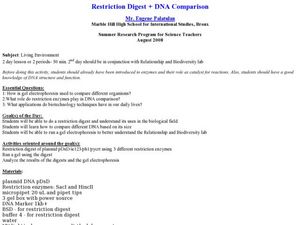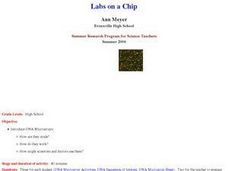Cornell University
Extracting DNA
Uncover the basics of DNA structure through exploration activities. Collaborative groups build DNA models and recreate the process of replication. Then, using plant cells such as peas or strawberries, they extract a DNA sample.
Curated OER
Determination of Phylogenetic Relationships Using Restriction Analysis
Students applied various mathematical analyses to interpret their data. By using the resulting DNA fragment patterns from several enzymes students established a possible evolutionary relationship among the mice.
Curated OER
The Great Cafeteria Caper
Learners extract DNA from their own hair roots. They run an electrophoresis gel to examine patterns of their DNA along with standard DNA. The experiment is based on a crime scene scenario.
Towson University
Case of the Crown Jewels
Can your biology class crack the Case of the Crown Jewels? Junior forensics experts try their hands at DNA restriction analysis in an exciting lab activity. The lesson introduces the concept of restriction analysis, teaches pipetting and...
Curated OER
Dinosaur and DNA Days
Biology stars extract DNA samples from beef thymus and then examine its properties. They use enzymes to digest the DNA samples, and then use electrophoresis to separate fragments. Finally, they discuss methods and principles of...
Nuffield Foundation
Extracting DNA from Living Things
Help! Someone's trying to take my DNA! An interesting lab experiment has scholars use basic materials to extract DNA. By applying ethanol, cold water, and a protease enzyme, like pineapple juice, they pull strands of DNA from peas,...
Curated OER
Restriction Digest + DNA Comparison
High schoolers compare different DNA and run a gel electrophoresis. For this DNA lesson students complete a DNA activity that allows them to better understand its structure and function.
Curated OER
Biotechnology
Students explore biotechnology through various activities. For this biology lesson, students analyze its pros and cons. They study and read informative articles about biotechnology.
Curated OER
To Smell or Not to Smell, That is the Ester
Pupils explain the basic concepts of polymerization. Students participate in a lab to create a crude preparation of carboxyl esterase and test its effectiveness in reducing the residual monomer in an emulsion such as paint.
Curated OER
Recombinant DNA - Electrophoresis Demonstration and Problem
Suitable for an AP Biology class, the lab found here has teen bioengineers working with plasmids to clone DNA. If you have not done a similar lab, the instructions may be rather difficult to follow. Both the teacher and learner...
Curated OER
The Basics of Biochemistry
Science teachers can introduce basic chemical concepts to biology students.
Serendip
Genetics
A handout on genetic inheritance begins with a reading on alleles and how they can result in albinism. Junior geneticists learn to complete Punnett squares and participate in a coin toss simulation of allele pairing. They also learn...
Curated OER
DNA on Stick
Students experience a "hands-on" activity to get visual evidence of the physical nature of DNA and the process of DNA purification. They explore one method of chromosomal DNA isolation and DNA extraction.
Curated OER
DNA Extraction From Living Things
Students extract DNA from split peas. In this biology lesson plan, students hypothesize what DNA looks like and perform the experiment to verify their hypothesis. They explain the importance of DNA in living things.
Curated OER
Selecting Soil Organisms in Compost
Learners demonstrate that many of the enzyme systems needed to break down--and therefore clean up-society's wastes already exist in nature among the decomposers. They select the best starch-munching organisms by altering the environment...
Curated OER
DNA Blueprint for Life
Students isolate DNA from different food sources. In this biology lesson, students research DNA extraction. They analyze DNA stands collected from the lab, and compare the differences between each.
Curated OER
Pesticides and Eggshell Thinning.
Students analyze the calcium content of egg shells as an introduction to the toxic effects of pesticides on biological systems.
Curated OER
Anatomy and Physiology "Quickies"
Students use a variety of creative writing tools within this assignment: poems on particular organ systems, write a short story and/or create a word graph. They are involved in a demonstration of lactic build up in the muscles, a...
Curated OER
Labs on A Chip
Students are introduced to DNA microarrays. They discuss how scientists and doctors use them and how they work. They complete a worksheet and discuss their findings.
Serendip
Genetic Engineering Challenge – How Can Scientists Develop a Type of Rice That Could Prevent Vitamin A Deficiency?
Brown rice contains vitamins B and E, while white rice lasts longer in storage. The availability of rice around the world makes it a great candidate for genetic engineering. Scholars apply their knowledge of genetic engineering to solve...
Curated OER
Simulation of Gene Splicing
Students simulate gene splicing by examining bacteria. They create a bacterial DNA into which they insert the human DNA (gene) that codes for growth hormone. They cut the sites of the enzyme to study how the human DNA can be joined to...
Curated OER
How Genes Work Lesson Plan
Students define the key terms that are the structure and function of DNA. In this genetics lesson students complete a lab activity in which they construct a model DNA structure.
Curated OER
SAY IT WITH DNA: Protein Synthesis Tutorial
Ninth graders explore protein synthesis. In this DNA lesson students complete a worksheet and a DNA lab activity.
Curated OER
Cracking the Code - Cloning Paper Plasmid
Students explore the "genetic code." They observe how genes may be manipulated for genetic research, gene cloning, and genetic engineering. In a lab setting, students examine the mechanics involved in cutting and ligating DNAs into a...

























